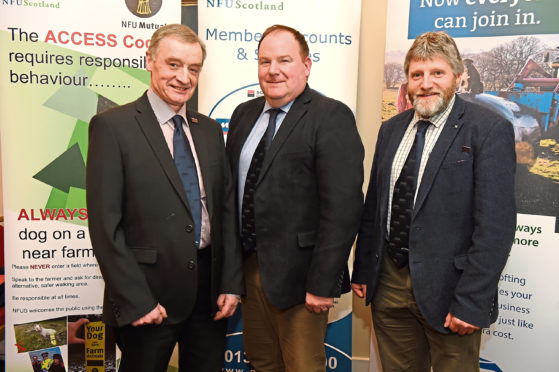Candidates in the running for NFU Scotland’s (NFUS) vice-presidential roles ended their 10-date tour campaign at Dingwall Mart on Wednesday evening.
Ian Sands from Balbeggie in Perthshire pledged that if elected, he would do more to promote a thriving, profitable and forward-thinking industry.
“Brexit has the potential to affect not just us but generations to come. This cannot be seen as the end but as the beginning because no matter what, change is coming – and the NFUS will have a massive job to influence Westminster and Holyrood governments to support Scottish agriculture for the benefit of the nation,” he said.
“I want the union at every opportunity to press home to politicians, civil servants and the general public the good work that our industry is doing, often at our own expense, and try to relieve some of the pressures that are being put upon us.”
Mr Sands also pointed out the challenges which the upland livestock sector is facing with cuts to Less Favoured Areas Support Scheme (LFASS) funding.
He said: “While this effects the upland sector, the ripple effect will affect us all in the long-term.”
Sitting vice-president Martin Kennedy, from Aberfeldy, also weighed in on the fiasco surrounding LFASS payments and the future of funding.
He said: “Half a billion pounds of the money coming into Scotland is money very well spent, but it could be spent better. We now have an opportunity to devise a support policy that awards those that are doing the work and taking the risk rather than simply paying out on the occupation of land.
“Farmers and crofters have never felt so undervalued and the proposed cuts under the LFASS parachute payment are not acceptable. I will fight tooth and nail to make sure we get that budget back up to the £65 million.”
Alford farmer Charlie Adam said the union must make efficient use of all its people and its resources.
He said: “We often hear that members don’t know enough about what we are doing, or we don’t communicate well enough. Members need to get regular information from us, and they need to know they’re being listened to.
“We have to involve the people who won’t or can’t come to meetings, especially new or young farmers. The industry must be heard loud and clear, and if not all the other lobbying interests will be in there. If we don’t counter them, they’ll get their way.”
Two vice-presidents will be elected next month.
